#ernst junger
Explore tagged Tumblr posts
Text
Philosophy resembles the meticulous operation of cracking a steel safe, where each imperceptible turn of the dial—each fractional modulation of pressure—seems to dissipate into silence, yielding no immediate response from the unyielding mechanism. Yet these minor adjustments, though seemingly inconsequential in isolation, serve as essential calibrations of the will against an enigmatic and indifferent structure. The process demands an attunement to imperceptible resistances, an exacting discipline that refines itself against the constraints of the unknown. The tumblers within the lock, hidden from sight, engage in a precise choreography of alignment, their tolerances allowing no margin for error. Only when each variable attains its designated position—when every false lead has been negated, when intuition and calculation coalesce into perfect synchronicity—does the mechanism yield. The heavy door swings open not as an arbitrary revelation, nor as an act of providence, but as the final triumph of methodical perseverance, where the steel of resistance is overcome by the tempered precision of an unrelenting intellect.
Ludwig Wittgenstein: Philosophical Occasions (Storm of Steel Edition)
79 notes
·
View notes
Text
Only the person who no longer believes in a happy ending, only he who has consciously renounced it, is able to live. A happy century does not exist; but there are moments of happiness, and there is freedom in the moment.
The Glass Bees
Ernst Junger
190 notes
·
View notes
Text
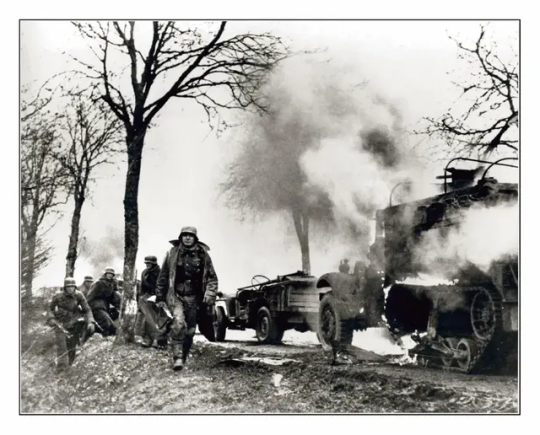
"Il ne fait aucun doute qu’il existe des individus qu’on doit tenir pour responsables du sang de millions d’êtres. Et ces individus sont avides du sang répandu, comme les tigres. Indépendamment de leurs bas instincts, il y a chez eux une volonté satanique, une froide jouissance à voir périr des hommes, et peut-être même l’humanité. Ils semblent saisis d’une profonde souffrance, d’un dépit rugissant, lorsqu’ils soupçonnent qu’une force quelconque pourrait les empêcher de dévorer autant d’êtres qu’en réclame leur avidité. Aussi les voit-on pousser également au massacre, dans des cas où il semblerait qu’ils dussent hésiter, dans des cas même où cela va à l’encontre de leur propre sécurité."
Ernst Jünger, Premier journal parisien. Journal II, 1941-1943, trad. Henri Plard, 8 février 1942.
10 notes
·
View notes
Text
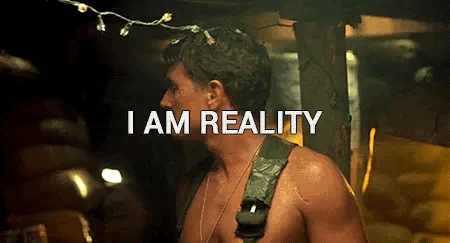
"Myth is not prehistory: it is timeless reality, that repeats itself in history. It is a good sign that our century is finding meaning again in the myths.” - Ernst Jünger, ‘The Forest Passage’ (1951) [p. 39]
#junger#jünger#ernst junger#ernst jünger#forest passage#myth#reality#platoon#barnes#sgt barnes#tom berenger
40 notes
·
View notes
Text
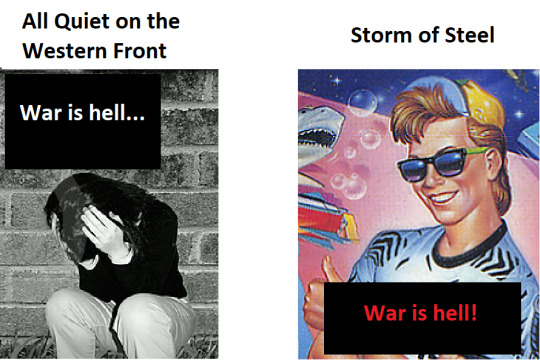
32 notes
·
View notes
Text
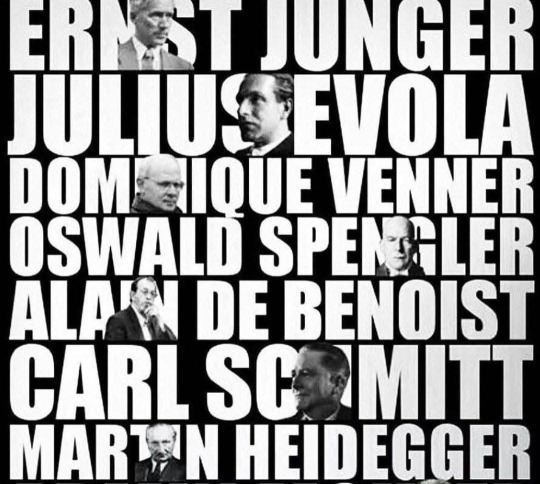
#ernst junger#julius evola#dominique venner#oswald spengler#alain de benoist#carl schmitt#martin heidegger
2 notes
·
View notes
Text
Life strives incessantly to stay in contact with pain. Indeed, discipline means nothing other than this, whether it is of the priestly-ascetic kind directed toward abnegation or of the warlike-heroic kind directed toward hardening oneself like steel. In both cases, it is a matter of maintaining complete control over life, so that at any hour of the day it can serve a higher calling. The central question concerning the rank of present values can be answered by determining to what extent the body can be treated as an object.
Ernst Jünger, On Pain
64 notes
·
View notes
Text
The heroic and cultic world presents an entirely different relation to pain than does the world of sensitivity. While in the latter, as we saw, it is a matter of marginalizing pain and sheltering life from it, in the former the point is to integrate pain and organize life in such a way that one is always armed against it. Here, too, pain plays a significant, but no doubt opposite, role. This is because life strives incessantly to stay in contact with pain. Indeed, discipline means nothing other than this, whether it is of the priestly ascetic kind directed toward abnegation or of the warlike heroic kind directed toward hardening oneself like steel. In both cases, it is a matter of maintaining complete control over life, so that at any hour of the day it can serve a higher calling. The secret of modern sensitivity is that it corresponds to a world in which the body is itself the highest value. This observation explains why modern sensitivity relates to pain as a power to be avoided at all cost, because here pain confronts the body not as an outpost but as the main force and essential core of life.
On Pain
Ernst Jünger
102 notes
·
View notes
Text
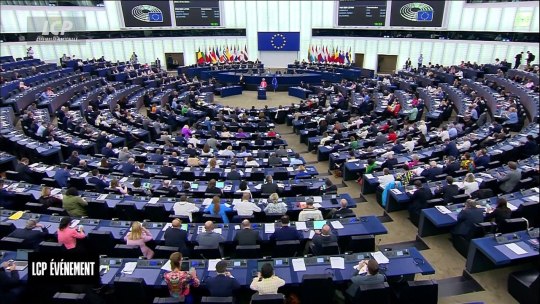
"Le retour des formes de l’absolutisme, toutefois sans aristocratie – je veux dire sans les distances intérieures – rend possibles des catastrophes dont l’ampleur échappe encore à notre imagination. Cependant, on les pressent, dans un sentiment de crainte qui jette son ombre même sur les triomphes."
Ernst Jünger, Premier journal parisien. Journal II, 1941-1943, trad. Henri Plard, 25 octobre 1941.
3 notes
·
View notes
Text
« Certes, j'ai un faible pour les systèmes d'ordre, pour l'Ordre des Jésuites, pour l'armée prussienne, pour la Cour de Louis XIV… Une telle rigueur m'en impose toujours ».
— Ernst Jünger, Der Spiegel n°33 (1982)

11 notes
·
View notes
Text
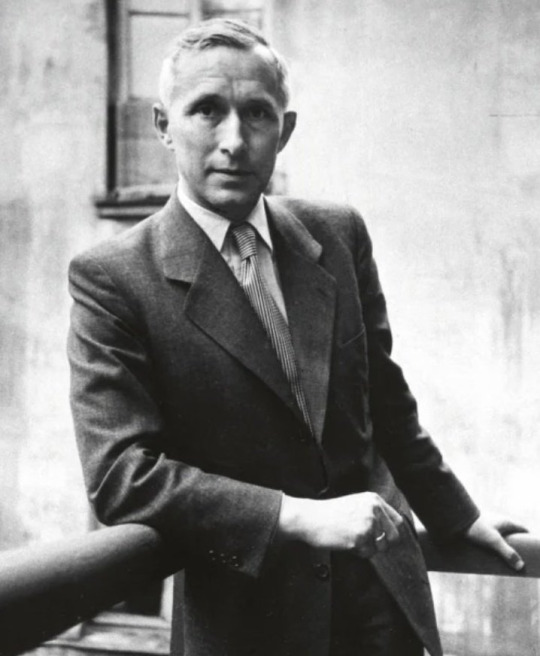
Chi non ha sperimentato su di sé l'enorme potenza del niente e non ne ha subìto la tentazione conosce ben poco la nostra epoca.
(Oltre la linea)
6 notes
·
View notes
Text

“THOUGHTS ON MUSIC:
Picture molecules teeming in your body. They are your body. Feel them moving. Then picture the infinite Nano-particles that comprise a molecule and that are themselves infinitely sub-dividable. Each one is moving, too. Each one is suffused with light and the driving force of Love. In this way the light spreads through your body, and is your body. Your body is composed of Love and Light. Your body is engaged in an act of constant interchange with the world in which it resides. As you breathe, you bring the world into your body. You're perpetually dissolving, congealing, dissolving. The world is feeding you, transforming you always, bringing death closer as it infuses you with life. This symbiotic interchange IS life, IS you, IS God thinking. You're not solely the temporary arrangement of molecules that constitute the "You" that you imagine. You are seamlessly intertwined with the world. Even your consciousness, your sense of self, your memories, fears and aspirations, are interlaced with the world around you, and by extension the furthest expanse of the universe. A handful of sand has a presence, a body - it's an entity there in your hand. When you sift the sand into a stream of moving water, it diffuses. What then is the body of sand that formerly was an entity in itself? This is you.
So why do you say "Love?" Is it a sort of subliminal wishful thinking, a weak minded faith that insists on calling the force and energy of life that fuels your existence "Love?" Indeed it is! This line of thinking is demonstrably weak, but palpably true, nevertheless. And with the correct and focused attention to this force, as the gentle wind rustles through the molecules and fibers of your being, it is revealed as Love. It feels like Love. Divorced from attachment, from interpretation, releasing your self to the stream of experience - this feels like Love. And this is what music accomplishes at its most sublime - a constant, unbroken swelling from inside - from inside everything, exhaling time from its mouth. Music IS time. How do you account for the unutterably sweet strangeness of existence at these moments? This is the lure, the scent to follow, always looking for this consuming presence, not an analog of the thing sought, but the thing itself...”
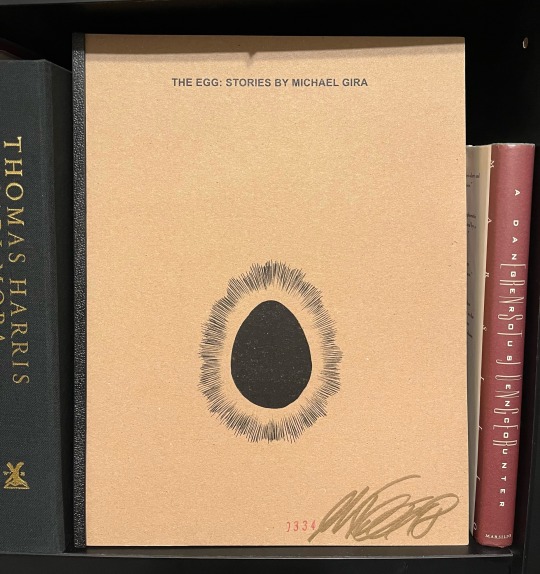
#gira#michael gira#swans#angels of light#world of skin#circus mort#music#books#bookshelf#library#art#love#god#egg#universe#thomas harris#ernst junger#ernst jünger
6 notes
·
View notes
Text
Il existe quelques grands critères immuables qui révèlent la valeur d’un homme. L’un d’entre eux est la douleur ; c’est la plus dure épreuve au sein de cette succession d’épreuves que l’on a coutume d’appeler la vie. C’est pourquoi une méditation consacrée à la douleur est forcément impopulaire : pourtant, non seulement elle est en soi riche d’enseignements, mais elle éclaire aussi sur une série de questions qui nous préoccupent aujourd’hui. La douleur est l’une de ces clefs qui ouvrent non seulement l’intimité de l’homme mais l’ensemble du monde. Si l’on approche du point de vue où l’homme se montre à la hauteur de la douleur ou même supérieure à elle, on accède aux sources de sa puissance et au secret qui se cache derrière sa domination. Dis-moi quel est ton rapport à la douleur, et je te dirai qui tu es !
Ernst Jünger, Sur la douleur, 1934
13 notes
·
View notes
Text
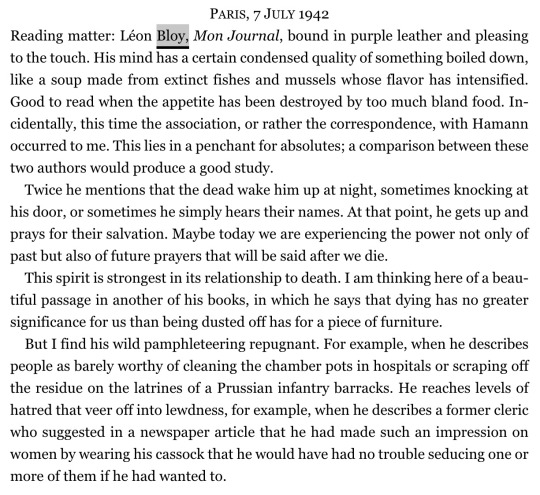
Ernst Jünger on Léon Bloy. (From Strahlungen, translated as A German Officer in Occupied Paris.)
2 notes
·
View notes
Text
The true leaders of the world are at home in their graves.
Ernst Junger, A German officer in occupied Paris, 23 November 1941
38 notes
·
View notes
